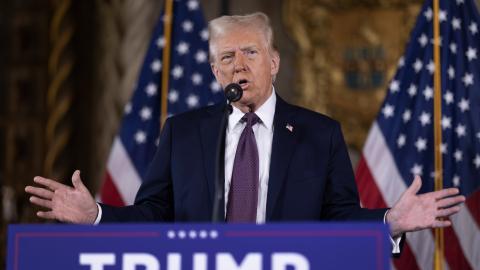In the ninth decade of his life, Henry Kissinger observed that any society was perpetually “in transit between a past that forms its memory and a vision of the future that inspires its evolution.” Without leadership, he wrote, “institutions drift, and nations court growing irrelevance and ultimately, disaster.” President-elect Donald Trump, in his second term, has the opportunity to shape current dislocations in the world in ways that favor American interests and drive toward greater stability.
Trump, in his first term and throughout his most recent campaign, made it clear that his vision for America is attaining peace through strength, ensuring that America’s economy is able to flourish and grow, and securing, as the Constitution says, the “blessings of liberty” for Americans today and for posterity.
Trump will pursue this vision in a changed world. The United States is facing a series of crises, generated in part by the Biden administration’s failure to deter U.S. adversaries. An axis of aggressors — Russia, China, Iran, and North Korea — have become increasingly brazen. Aggressors launched wars in Europe and the Middle East. Global trade has been severely and expensively disrupted in the Red Sea by Houthi rebels, who are clients of the theocratic dictators in Tehran. Undersea cables have been sabotaged in the Baltic Sea, affecting both power transmission and data communications between NATO allies of the U.S. in the region.
Over the past two years, China’s cyberattacks have gotten more brazen, with state-supported hackers penetrating everything from telecommunications to water utilities and electrical grids. Trillions of dollars of intellectual property from multinational companies across the energy, pharma, and manufacturing sectors have been stolen. Top U.S. officials recently warned publicly that China’s hackers are positioning themselves on U.S. critical infrastructure to conduct massive sabotage in the event of a conflict with the U.S.
Trump has four qualities as a leader and commander in chief that will position him to advance his vision despite these challenges.
First, his confidence in America is a starting point for projecting strength, which in turn contributes to stability. Trump’s political belief system is built on his view of America as an exceptional country, one that should inspire pride in its people and that has advantages that should be protected and grown. As he made clear during his first term, “The American Republic stands today as the greatest, most exceptional, and most virtuous nation in the history of the world.” His call to make America great is a call to realize its full potential.
Second, he tempers his confidence in America with a realistic view of our nation’s strengths and limitations. A sober view of America’s interests and role in the world is essential if American commitments are to be sustained over the long term. As a commander in chief, he is cautious about the use of force. He understands that U.S. agency is limited and that some commitments have costs that far exceed prospective benefits. In his view, we can and should seek to catalyze positive developments but also ask for and, if needed, demand that partners carry their share of responsibility. His realism is paired with demands for reciprocity.
Third, he is decisive. In his first term, he acted quickly to restore the dynamism of the U.S. economy. Abroad, he reversed dozens of policies of the Obama administration that weakened the U.S.’s position in the world. His demands that NATO allies up their defense spending produced results. He added billions of dollars to the defense budget to restore the military after the devastating effects of Obama-era sequestration. He challenged Iran’s destabilizing actions across the Middle East, armed Ukraine, and imposed tariffs to begin to right the trade imbalances vis-a-vis China. Seldom has an American president acted so decisively across a range of matters in a short period of time.
Fourth, Trump seeks agreements with adversaries where possible. While he may overestimate what he can achieve personally, leader to leader, he sees negotiations as a central dynamic of world politics. What some view as disruptive statements are often calculated to gain leverage and enter negotiations from a position of relative advantage. He understands the need for accommodations but also understands the downside of a bad deal. Trump’s decision to cut short the Hanoi Summit with North Korean dictator Kim Jong Un in February 2019 is a case in point. His views are consistent with former President Richard Nixon’s point in 1967, also a period of geopolitical dislocation: “I believe in building bridges, but we should build only our end of the bridge.”
Critics often blame Trump for driving the breakdown of the so-called liberal international order — an order that America built in the post-World War II period. This criticism reversed causality. The system has deteriorated for many reasons.
Trump’s confidence, understanding of America’s competitive advantages and limitations, decisiveness, and negotiating skills will be central to the ways that he addresses today’s challenges. As America’s new commander in chief, he has the ability to arrest the drift in U.S. foreign policy and chart a course for a better future.
Enjoyed this op-ed? Subscribe to Hudson’s newsletters to stay up to date with our latest content.



















